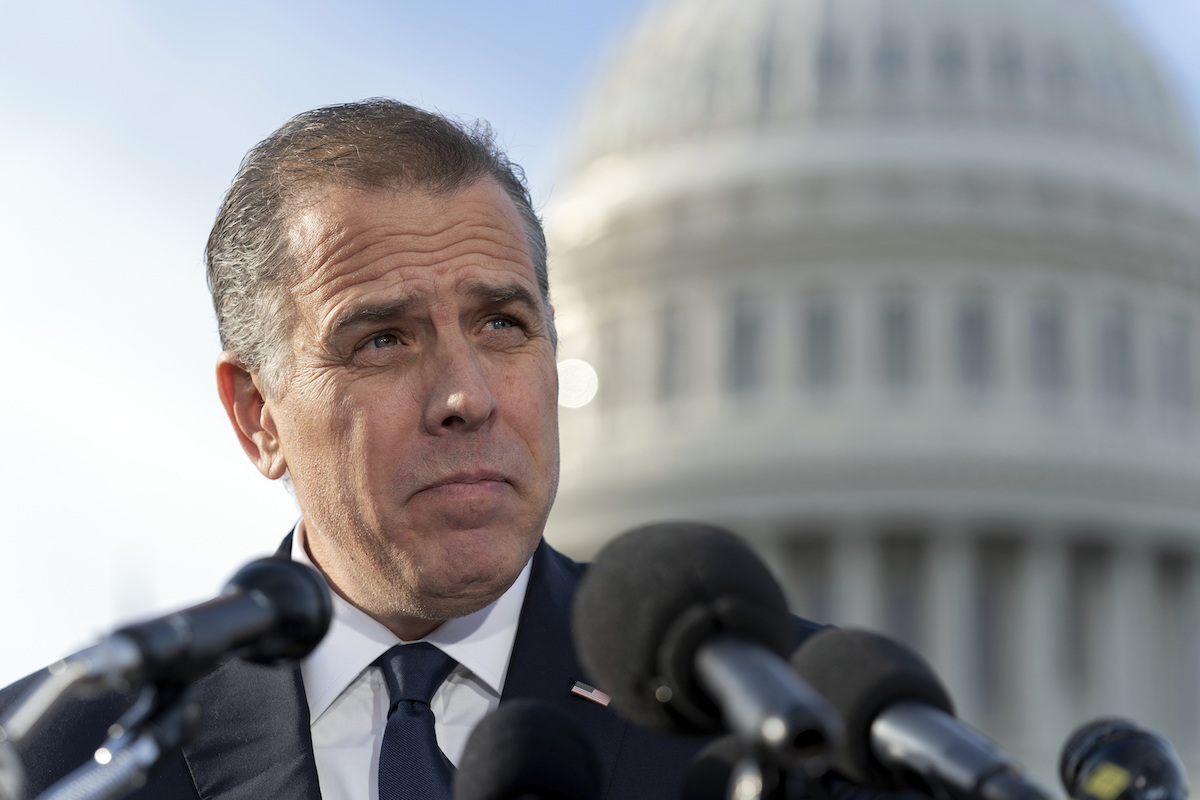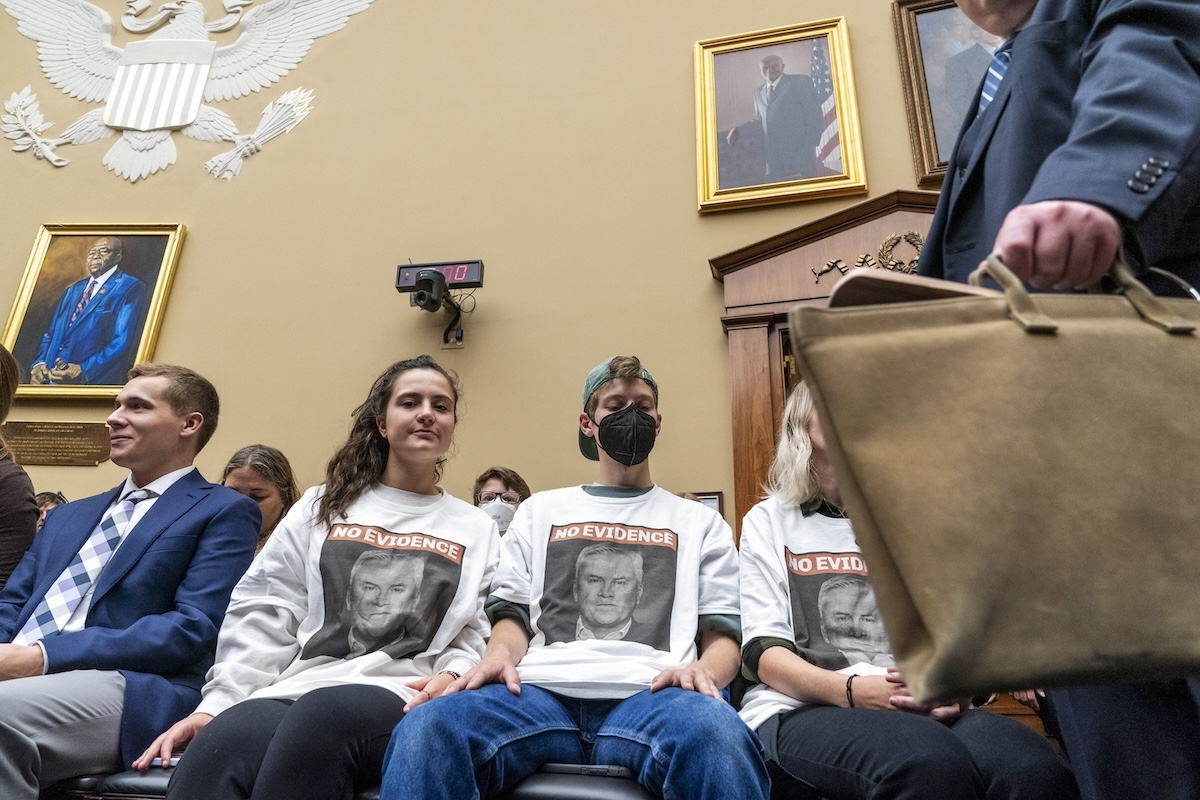With one arrest, some politicians and pundits speculated that the evidence that President Joe Biden accepted a bribe disappeared. But did it?
Tuning into cable news networks, the answer depended on which channel you consulted.
On MSNBC, FBI informant Alexander Smirnov’s indictment was characterized as a “spectacular embarrassment” to Republicans’ continuing effort to impeach Biden.
“The special counsel, Republican appointee, leading the case against Hunter Biden, who was appointed by Donald Trump now says that that guy — this informant they hung their entire claim on about the bribe — he lied,” Chris Hayes, host of “All In,” said Feb. 15.
On Feb. 16, Fox News host Sean Hannity said the informant’s indictment made Democrats “giddy,” with Biden and Rep. Jamie Raskin, D-Md., calling for the impeachment inquiry to be dropped.
“There’s a lot to unpack here,” Hannity said. He described the FBI informant’s story as “a very, very small part of what is a large body of evidence” supporting the impeachment inquiry and said. “None of this negates the fact that Joe Biden lied about his knowledge of his son’s business dealings.”
House Republicans have spent years investigating the Biden family’s business dealings and, in 2023, formally launched an impeachment inquiry into Biden. Throughout the investigation, Republicans have characterized Smirnov’s allegations that Biden accepted a $5 million bribe as vice president as central to the impeachment effort. As of Feb. 23, their investigation has produced no evidence that Biden engaged in wrongdoing or accepted a bribe.
Who is this informant, and what does it mean for Republicans’ impeachment case? Here’s what we know:
Who is Alexander Smirnov?
Alexander Smirnov became an FBI “confidential human source,” or FBI informant, in 2010, according to the indictment. Court filings have revealed little about Smirnov, 43: He previously lived in California and he has lived in Las Vegas since 2022. It is unclear where Smirnov was born.
Smirnov was repeatedly told he must provide truthful information to the FBI, but he “provided false derogatory information to the FBI” about Biden and his son Hunter, the indictment said.
In June 2020, Smirnov claimed that in 2015 or 2016, executives at Burisma — a Ukrainian energy company that once employed Hunter Biden — said they paid $5 million each to Joe Biden and Hunter when Joe Biden was still vice president so that Joe Biden would remove then-Ukrainian Prosecutor General Viktor Shokin and end a Shokin-led criminal investigation into Burisma.
In June, Republicans and Democrats reviewed a redacted form with Smirnov’s allegations and said the FBI had described him as “highly credible.” At the time, the FBI made clear the allegations were unverified.
These bribery allegations were a central part of House Republicans’ continuing impeachment case against Biden.
What does the indictment accuse Smirnov of?
Smirnov’s bribery claims “were fabrications,” according to the indictment. Smirnov was indicted on one count of making a false statement to a government agent and one count of falsifying records in a federal investigation, when Smirnov knowingly caused the creation of a false entry on an FBI 1023 form used to document his bribery allegations.
The indictment said Smirnov had contact with Burisma executives in 2017, after Biden’s vice presidency ended and after Shokin — who was widely considered corrupt and ineffective — was fired in February 2016.
“In other words, when (Biden) had no ability to influence U.S. policy and when (Shokin) was no longer in office,” the indictment said.
Prosecutors said Smirnov “transformed his routine and unextraordinary business” with Burisma executives “into bribery allegations against Public Official 1, the presumptive nominee of one of the two major political parties for President, after expressing bias against Public Official 1 and his candidacy.”
In the indictment, Biden is referred to only as “Public Official 1” and his son Hunter is described as “Business Person 1.”
As they asked the court to keep Smirnov detained Feb. 20, prosecutors said Smirnov has “extensive foreign ties, including, most troublingly and by his own account, contact with foreign intelligence services, including Russian intelligence agencies, and has had such contacts recently.”
Special Counsel David Weiss, a Trump appointee, brought the charges against Smirnov, who, if convicted, could face 25 years in prison.
What is Hunter Biden’s link to Burisma?
Hunter Biden joined Burisma’s board in 2014. At the time, his father, then the vice president, publicly represented U.S. policy in Ukraine.
Hunter, a lawyer and businessman, had no particular expertise in energy or Ukraine. His Burisma ties were public knowledge in 2014 and have been scrutinized for years.
Hunter left Burisma’s board in 2019, when Biden launched his campaign for president.

Hunter Biden, son of President Joe Biden, talks to reporters at the U.S. Capitol on Dec. 13, 2023. (AP)
Were Smirnov’s allegations crucial to impeachment?
Smirnov’s allegations that Biden accepted a $5 million bribe while vice president were a key element of Republicans’ Biden investigation.
In May, House Republicans subpoenaed the FBI for the record — called an FD-1023 form — that documented Smirnov’s allegations against Biden. FBI agents use FD-1023 forms to record unverified reporting from confidential human sources.
Rep. James Comer, R-Ky., chair of the House Oversight Committee that has been investigating the Biden family’s business dealings, told Fox News’ Jesse Watters that the form was “a very crucial piece of our investigation.”

House Republicans, from left, Oversight and Accountability Committee Chairman James Comer, Rep. Jim Jordan and Rep. Jason Smith make a statement to reporters about their impeachment inquiry of President Joe Biden at the Capitol in Washington, Dec. 5, 2023. (AP)
In response, Christopher Dunham, an FBI official, wrote that a 1023 form does not “validate the information, establish its credibility, or weigh it against other information known or developed by the FBI.”
“The mere existence of such a document would establish little beyond the fact that a confidential human source provided information and the FBI recorded it,” Dunham wrote.
After Republicans threatened to hold the FBI director in criminal contempt of Congress, the agency in June allowed lawmakers to privately review Smirnov’s statements in the 1023 form. Smirnov’s identity was then unknown. In July, against the FBI’s wishes, Sen. Chuck Grassley, R-Iowa, obtained and released the form.
When Republicans announced a formal impeachment inquiry into Biden in September, then-House Speaker Kevin McCarthy listed Smirnov’s claims among the “serious and credible allegations” against Biden.
“Even a trusted FBI informant has alleged a bribe to the Biden family,” McCarthy said. He also said that eyewitnesses have testified that Biden, as vice president, “joined on multiple phone calls and had multiple interactions” that were lucrative for Hunter Biden and Hunter’s associates. McCarthy also cited foreign payments to Biden family members and associates as cause for alarm.
The evidence Republicans have provided so far, including during the impeachment inquiry, has not proved Biden engaged in wrongdoing, however.
A convoluted maze of financial records released by House Republicans shows that Biden family members and associates received $20 million in payments from sources with ties to foreign countries. About $5 million of that went to Hunter Biden and other Biden family members, with the rest going to Biden family business associates.
The bank records show no evidence that any payments went to Joe Biden, who was vice president when some of the payments occurred.
In January, Rep. Jim Jordan, R-Ohio, an Oversight Committee member, told Fox News’ Sean Hannity that the 1023 form documenting Smirnov’s statements was the “most corroborating evidence” Republicans had supporting allegations that Biden accepted a multimillion-dollar bribe.
(Internet Archive)
The response to Smirnov’s indictment
After Smirnov’s indictment, Comer said in a statement to PolitiFact that the impeachment inquiry “is not reliant” on Smirnov’s claims. Jordan also walked back his earlier statement.
“Bank records don’t lie,” Comer said, adding that the records show millions of dollars in payments to the Bidens, from people or businesses linked to Russia, China, Romania, Kazakhstan and Ukraine.
The committee’s four memos of bank records neither claim nor prove that Biden accepted a bribe.
Comer said witness testimony shows that “the Bidens were selling Joe Biden as the brand” and that “Biden knew about and participated in his family’s business schemes.”
PolitiFact and other news outlets reported that Republicans misconstrued, oversold or misrepresented what they learned from testimony provided by Devon Archer, one of Hunter’s former business associates. Another witness, Tony Bobulinski, has made unproved allegations that Biden was involved in one of his family’s business ventures.

Protesters in the audience wear T-shirts with the face of House Oversight Committee Chair James Comer, R-Ky., and the words, “No Evidence,” on them as the committee begins an impeachment inquiry into President Joe Biden, Sept. 28, 2023, on Capitol Hill in Washington. (AP)
An October poll found that 35% of adults said they believe Biden has acted illegally regarding Hunter’s overseas business dealings, and 33% said he acted unethically, The Associated Press-NORC Center for Public Affairs Research reported.
The White House pointed PolitiFact to Biden’s Feb. 16 response to Smirnov’s indictment: “He is lying,” Biden said of Smirnov.
The impeachment inquiry, “should be dropped,” Biden said. “It’s been an outrageous effort from the beginning.”
Raskin and Oversight Committee Democrats called for Republicans to end the inquiry. Raskin said the indictment “demonstrated how key evidence at the heart of House Republicans’ impeachment inquiry is based on a lie.”
With a narrow House majority, Republicans would need nearly all party members to impeach Biden, and GOP lawmakers say they do not have the votes. Even then, to remove Biden, the Democratic-majority Senate would have to vote to convict.
PolitiFact Researcher Caryn Baird contributed to this report.
RELATED: Largest share of foreign payments went to Biden associates, not kin, House GOP memos show
RELATED: Transcript of Devon Archer testimony doesn’t back key claims about Joe and Hunter Biden













